Deck 12: Managing Production Across the Supply Chain
Question
Question
Question
Question
Question
Question
Question
Question
Question
Question
Question
Question
Question
Question
Question
Question
Question
Question
Question
Question
Question
Question
Question
Question
Question
Question
Question
Question
Question
Question
Question
Question
Question
Question
Question
Question
Question
Question
Question
Question
Question
Question
Question
Question
Question
Question
Question
Question
Question
Question
Question
Question
Question
Question
Question
Question
Question
Question
Question
Question
Question
Question
Question
Question
Question
Question
Question
Question
Question
Question
Question
Question
Question
Question
Question
Question
Question
Question
Question
Question

Unlock Deck
Sign up to unlock the cards in this deck!
Unlock Deck
Unlock Deck
1/96
Play
Full screen (f)
Deck 12: Managing Production Across the Supply Chain
1
Given the forecast and booked orders shown in the table, and a beginning inventory of 120, what is the MPS for period 4? The company operates with a lot size of 144.
A)432
B)576
C)288
D)144
A)432
B)576
C)288
D)144
576
2
Which of these correctly explains the relationship between available to promise inventory and the master production schedule for any week beyond the first week of the schedule when production is scheduled? Note that ATP is available to promise, MPS is master production schedule, EI is ending inventory, and OB is orders booked.
A)ATP = MPS +
B)MPS = ATP +
C)ATP = EI + MPS -
D)MPS = + ATP - EI
A)ATP = MPS +
B)MPS = ATP +
C)ATP = EI + MPS -
D)MPS = + ATP - EI
MPS = ATP +
3
Given the forecast and booked orders shown in the table, and a beginning inventory of 75, what is the available to promise inventory for period 4? The company operates with a lot size of 50.
A)150
B)145
C)155
D)140
A)150
B)145
C)155
D)140
150
4
Master scheduling accomplishes which of these?
A)calculates the quantity of material orders
B)calculates the timing of material orders
C)determines when specific products will be made
D)sets overall workforce levels
A)calculates the quantity of material orders
B)calculates the timing of material orders
C)determines when specific products will be made
D)sets overall workforce levels

Unlock Deck
Unlock for access to all 96 flashcards in this deck.
Unlock Deck
k this deck
5
The length of time that the master schedule record extends into the future is the:
A)transient phase.
B)ATP.
C)planning horizon.
D)forecast.
A)transient phase.
B)ATP.
C)planning horizon.
D)forecast.

Unlock Deck
Unlock for access to all 96 flashcards in this deck.
Unlock Deck
k this deck
6
Given the forecast and booked orders shown in the table, and a beginning inventory of 120, what is the projected ending inventory for period 4? The company operates with a lot size of 144.
A)34
B)38
C)46
D)22
A)34
B)38
C)46
D)22

Unlock Deck
Unlock for access to all 96 flashcards in this deck.
Unlock Deck
k this deck
7
On the master schedule record, the amount of product that will be finished and available for sale at the beginning of each week is the:
A)master production schedule.
B)booked orders.
C)projected inventory.
D)available to promise inventory.
A)master production schedule.
B)booked orders.
C)projected inventory.
D)available to promise inventory.

Unlock Deck
Unlock for access to all 96 flashcards in this deck.
Unlock Deck
k this deck
8
Which of these correctly explains the relationship between available to promise inventory and the master production schedule for the first week of the schedule when production is scheduled? Note that ATP is available to promise, MPS is master production schedule, EI is ending inventory, and OB is orders booked.
A)ATP = MPS +
B)MPS = ATP +
C)ATP = EI + MPS -
D)MPS = + ATP - EI
A)ATP = MPS +
B)MPS = ATP +
C)ATP = EI + MPS -
D)MPS = + ATP - EI

Unlock Deck
Unlock for access to all 96 flashcards in this deck.
Unlock Deck
k this deck
9
Given the forecast and booked orders shown in the table, and a beginning inventory of 120, what is the ATP for period 4? The company operates with a lot size of 144.
A)92
B)108
C)126
D)144
A)92
B)108
C)126
D)144

Unlock Deck
Unlock for access to all 96 flashcards in this deck.
Unlock Deck
k this deck
10
Available to promise inventory is always zero for the first week in the master production schedule.

Unlock Deck
Unlock for access to all 96 flashcards in this deck.
Unlock Deck
k this deck
11
Which of these statements is best?
A)Master scheduling shows the sales and operations plan in greater detail on a product-by-product basis.
B)Sales and operations planning shows the master schedule in greater detail on a product-by-product basis.
C)Master scheduling shows the sales and operations plan in greater detail on a supplier-by-supplier basis.
D)Sales and operations planning shows the master schedule in greater detail on a supplier-by-supplier basis.
A)Master scheduling shows the sales and operations plan in greater detail on a product-by-product basis.
B)Sales and operations planning shows the master schedule in greater detail on a product-by-product basis.
C)Master scheduling shows the sales and operations plan in greater detail on a supplier-by-supplier basis.
D)Sales and operations planning shows the master schedule in greater detail on a supplier-by-supplier basis.

Unlock Deck
Unlock for access to all 96 flashcards in this deck.
Unlock Deck
k this deck
12
A unit that has not been sold or otherwise committed to any other customer should be considered available to promise.

Unlock Deck
Unlock for access to all 96 flashcards in this deck.
Unlock Deck
k this deck
13
Which step in the top down model of manufacturing planning and control system comes after sales and operations planning?
A)master scheduling
B)material requirements planning
C)production activity control
D)vendor order management
A)master scheduling
B)material requirements planning
C)production activity control
D)vendor order management

Unlock Deck
Unlock for access to all 96 flashcards in this deck.
Unlock Deck
k this deck
14
On the master schedule record, the amount of product that will be finished and available for sale each week given those units have already been promised to customers is the:
A)master production schedule.
B)booked orders.
C)projected inventory.
D)available to promise inventory.
A)master production schedule.
B)booked orders.
C)projected inventory.
D)available to promise inventory.

Unlock Deck
Unlock for access to all 96 flashcards in this deck.
Unlock Deck
k this deck
15
Which of the following statements regarding master production scheduling calculations is BEST?
A)Forecasted demand always exceeds booked orders.
B)Booked orders always exceed forecasted demand.
C)If booked orders are greater than forecasted orders, there must be a master production schedule for that period.
D)If ending inventory is greater than or equal to zero, there is no master production schedule quantity for that period.
A)Forecasted demand always exceeds booked orders.
B)Booked orders always exceed forecasted demand.
C)If booked orders are greater than forecasted orders, there must be a master production schedule for that period.
D)If ending inventory is greater than or equal to zero, there is no master production schedule quantity for that period.

Unlock Deck
Unlock for access to all 96 flashcards in this deck.
Unlock Deck
k this deck
16
Given the forecast and booked orders shown in the table, and a beginning inventory of 20, what is the available to promise inventory for the first period? There are no LOT quantity constraints.
A)0
B)10
C)20
D)40
A)0
B)10
C)20
D)40

Unlock Deck
Unlock for access to all 96 flashcards in this deck.
Unlock Deck
k this deck
17
Since the booked orders figure represents actual customer demand in a master schedule, that value is always less than or equal to forecasted demand.

Unlock Deck
Unlock for access to all 96 flashcards in this deck.
Unlock Deck
k this deck
18
Given the forecast and booked orders shown in the table, and a beginning inventory of 25, what is the master production schedule quantity for period 4?
A)35
B)40
C)55
D)70
A)35
B)40
C)55
D)70

Unlock Deck
Unlock for access to all 96 flashcards in this deck.
Unlock Deck
k this deck
19
Given the forecast and booked orders shown in the table, and a beginning inventory of 0, what is the available to promise inventory for period 3? There are no LOT quantity constraints.
A)0
B)12
C)24
D)36
A)0
B)12
C)24
D)36

Unlock Deck
Unlock for access to all 96 flashcards in this deck.
Unlock Deck
k this deck
20
From a revenue standpoint, a producer would rather have higher forecasted demand than booked orders.

Unlock Deck
Unlock for access to all 96 flashcards in this deck.
Unlock Deck
k this deck
21
A manufacturing company enters 2016 with a forecast and customer orders as shown in the table. They have a beginning inventory of 25 units and a batch size of 25 units (all MPS quantities must be in multiples of 25). Complete the rest of the master production schedule by filling in the projected ending inventory, master production schedule quantity, and available to promise rows.



Unlock Deck
Unlock for access to all 96 flashcards in this deck.
Unlock Deck
k this deck
22
Given the forecast and booked orders shown in the table, and a beginning inventory of 12, complete this master production schedule. The company operates with a lot size of 144.



Unlock Deck
Unlock for access to all 96 flashcards in this deck.
Unlock Deck
k this deck
23
Confirmed demand for products is called ________ in master scheduling.

Unlock Deck
Unlock for access to all 96 flashcards in this deck.
Unlock Deck
k this deck
24
When calculating ending inventory, what does the option presented in the -maximum(F,OB)portion of the equation accomplish? In other words, why don't we always subtract the F value or always subtract the OB value.

Unlock Deck
Unlock for access to all 96 flashcards in this deck.
Unlock Deck
k this deck
25
Consider the product structure tree shown below: 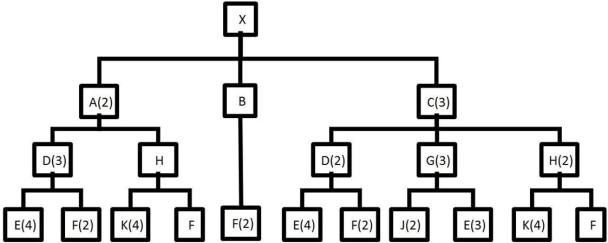 With a beginning inventory of twenty for all components on level one, five for all components on level two, and zero for all components on level three and finished items, how many K's are needed to produce 25 product X's?
With a beginning inventory of twenty for all components on level one, five for all components on level two, and zero for all components on level three and finished items, how many K's are needed to produce 25 product X's?
A)530
B)540
C)550
D)560
 With a beginning inventory of twenty for all components on level one, five for all components on level two, and zero for all components on level three and finished items, how many K's are needed to produce 25 product X's?
With a beginning inventory of twenty for all components on level one, five for all components on level two, and zero for all components on level three and finished items, how many K's are needed to produce 25 product X's?A)530
B)540
C)550
D)560

Unlock Deck
Unlock for access to all 96 flashcards in this deck.
Unlock Deck
k this deck
26
The longer the production and supplier lead times, the longer the master scheduling record's planning horizon needs to be.

Unlock Deck
Unlock for access to all 96 flashcards in this deck.
Unlock Deck
k this deck
27
Material requirements planning is performed at a greater level of detail than master scheduling.

Unlock Deck
Unlock for access to all 96 flashcards in this deck.
Unlock Deck
k this deck
28
An operations manager should be able to take the master schedules and add them up to arrive at the inventory and production levels in the sales and operations plan.

Unlock Deck
Unlock for access to all 96 flashcards in this deck.
Unlock Deck
k this deck
29
Consider the product structure tree shown below: 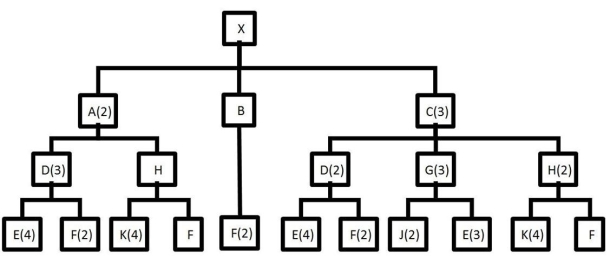 With a beginning inventory of zero for all components and finished items, how many assembly E's are needed to produce 20 product X's?
With a beginning inventory of zero for all components and finished items, how many assembly E's are needed to produce 20 product X's?
A)900
B)1000
C)1200
D)1500
 With a beginning inventory of zero for all components and finished items, how many assembly E's are needed to produce 20 product X's?
With a beginning inventory of zero for all components and finished items, how many assembly E's are needed to produce 20 product X's?A)900
B)1000
C)1200
D)1500

Unlock Deck
Unlock for access to all 96 flashcards in this deck.
Unlock Deck
k this deck
30
________ translates the master schedule for final products into detailed material requirements.

Unlock Deck
Unlock for access to all 96 flashcards in this deck.
Unlock Deck
k this deck
31
Describe the scope, inputs, and outputs of sales and operations planning, master scheduling, and MRP.

Unlock Deck
Unlock for access to all 96 flashcards in this deck.
Unlock Deck
k this deck
32
Consider the product structure tree shown below: 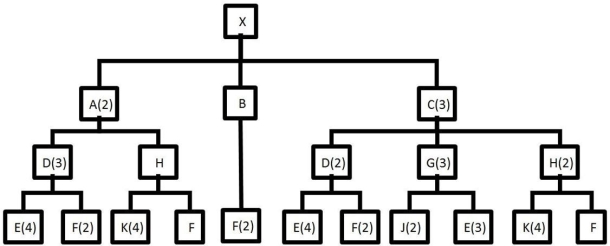 With a beginning inventory of twenty for all components on level one, five for all components on level two, and zero for all components on level three and finished items, how many more K's than F's are needed to produce 25 product X's?
With a beginning inventory of twenty for all components on level one, five for all components on level two, and zero for all components on level three and finished items, how many more K's than F's are needed to produce 25 product X's?
A)15
B)10
C)5
D)0
 With a beginning inventory of twenty for all components on level one, five for all components on level two, and zero for all components on level three and finished items, how many more K's than F's are needed to produce 25 product X's?
With a beginning inventory of twenty for all components on level one, five for all components on level two, and zero for all components on level three and finished items, how many more K's than F's are needed to produce 25 product X's?A)15
B)10
C)5
D)0

Unlock Deck
Unlock for access to all 96 flashcards in this deck.
Unlock Deck
k this deck
33
The estimated inventory level of an end item at the end of each time period is the ________.

Unlock Deck
Unlock for access to all 96 flashcards in this deck.
Unlock Deck
k this deck
34
Consider the product structure tree shown below: 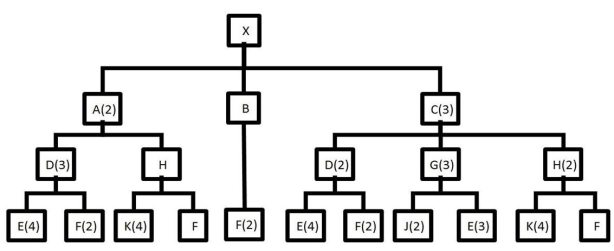 With a beginning inventory of ten for all components on level one, five for all components on level two, and zero for all components on level three and finished items, how many assembly E's are needed to produce 20 product X's?
With a beginning inventory of ten for all components on level one, five for all components on level two, and zero for all components on level three and finished items, how many assembly E's are needed to produce 20 product X's?
A)1175
B)1500
C)1325
D)1225
 With a beginning inventory of ten for all components on level one, five for all components on level two, and zero for all components on level three and finished items, how many assembly E's are needed to produce 20 product X's?
With a beginning inventory of ten for all components on level one, five for all components on level two, and zero for all components on level three and finished items, how many assembly E's are needed to produce 20 product X's?A)1175
B)1500
C)1325
D)1225

Unlock Deck
Unlock for access to all 96 flashcards in this deck.
Unlock Deck
k this deck
35
In order to calculate the ending inventory for period 42, you need to know what the ending inventory was for period 41.

Unlock Deck
Unlock for access to all 96 flashcards in this deck.
Unlock Deck
k this deck
36
Given the forecast and booked orders shown in the table, and a beginning inventory of 120, complete this master production schedule. The company operates with a lot size of 144.



Unlock Deck
Unlock for access to all 96 flashcards in this deck.
Unlock Deck
k this deck
37
Explain all of the information that is provided by a master schedule.

Unlock Deck
Unlock for access to all 96 flashcards in this deck.
Unlock Deck
k this deck
38
________ translates the sales and operations plan into specifics by product and establishes when each customer order will be fulfilled.

Unlock Deck
Unlock for access to all 96 flashcards in this deck.
Unlock Deck
k this deck
39
The longer the production and supplier lead times, the ________ the MPS record's ________ should be.

Unlock Deck
Unlock for access to all 96 flashcards in this deck.
Unlock Deck
k this deck
40
Consider the product structure tree shown below: 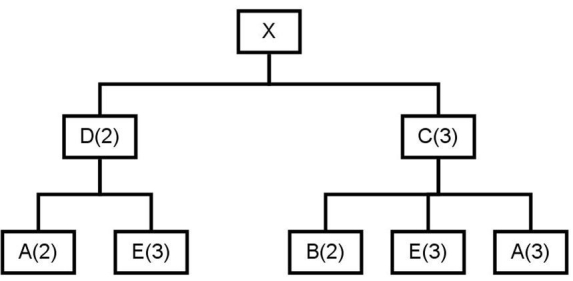 With a beginning inventory of zero for all components and finished items, how many assembly A's are needed to produce 25 product X's?
With a beginning inventory of zero for all components and finished items, how many assembly A's are needed to produce 25 product X's?
A)125
B)250
C)325
D)400
 With a beginning inventory of zero for all components and finished items, how many assembly A's are needed to produce 25 product X's?
With a beginning inventory of zero for all components and finished items, how many assembly A's are needed to produce 25 product X's?A)125
B)250
C)325
D)400

Unlock Deck
Unlock for access to all 96 flashcards in this deck.
Unlock Deck
k this deck
41
Component J is ordered on February 1, is received, and is ready to use on February 8. Its planning lead time is seven days.

Unlock Deck
Unlock for access to all 96 flashcards in this deck.
Unlock Deck
k this deck
42
MRP nervousness refers to the notion that a small change at the top of a bill of material can have drastic effects on items farther down the bill of material.

Unlock Deck
Unlock for access to all 96 flashcards in this deck.
Unlock Deck
k this deck
43
The planning technique that uses the master production schedule to monitor key resource requirements is:
A)rough-cut capacity planning.
B)horizon planning.
C)resource planning.
D)handfield planning.
A)rough-cut capacity planning.
B)horizon planning.
C)resource planning.
D)handfield planning.

Unlock Deck
Unlock for access to all 96 flashcards in this deck.
Unlock Deck
k this deck
44
MRP is NOT capable of:
A)lowering inventory levels.
B)helping a firm meet their master schedule commitments.
C)telling a firm's suppliers what needs to be made and by when.
D)sequencing jobs at a machining center.
A)lowering inventory levels.
B)helping a firm meet their master schedule commitments.
C)telling a firm's suppliers what needs to be made and by when.
D)sequencing jobs at a machining center.

Unlock Deck
Unlock for access to all 96 flashcards in this deck.
Unlock Deck
k this deck
45
Which of these actions would tend to make an MRP system less nervous?
A)using the same component, such as a fastener, at multiple levels throughout the product structure tree
B)making the minimum order quantity as small as possible
C)increasing the number of levels in a product structure tree
D)increasing the minimum order quantities only at the highest level of a bill or materials
A)using the same component, such as a fastener, at multiple levels throughout the product structure tree
B)making the minimum order quantity as small as possible
C)increasing the number of levels in a product structure tree
D)increasing the minimum order quantities only at the highest level of a bill or materials

Unlock Deck
Unlock for access to all 96 flashcards in this deck.
Unlock Deck
k this deck
46
Company B has no inventory at any level and a structure tree as shown below. They will need 145 E's to make 12 units of end item X. 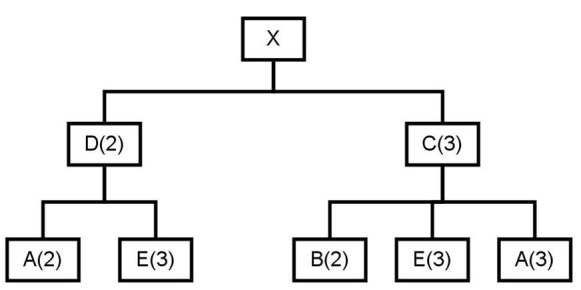


Unlock Deck
Unlock for access to all 96 flashcards in this deck.
Unlock Deck
k this deck
47
Using this MRP record and a lead time of 3 weeks, what should the planned orders be in week 1?
A)200
B)300
C)400
D)500
A)200
B)300
C)400
D)500

Unlock Deck
Unlock for access to all 96 flashcards in this deck.
Unlock Deck
k this deck
48
With an inventory as shown in the table, how many assembly E's should be produced or purchased to produce 15 product X's with this product structure tree? 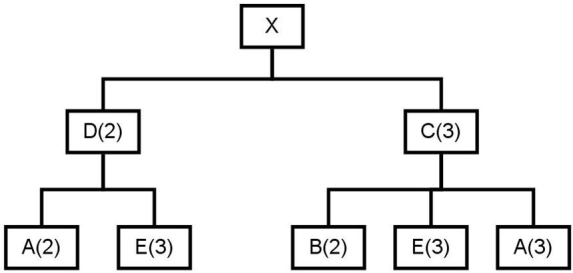
A)91
B)147
C)193
D)225

A)91
B)147
C)193
D)225

Unlock Deck
Unlock for access to all 96 flashcards in this deck.
Unlock Deck
k this deck
49
There is no beginning inventory. What are the net requirements in week 4 if there is a scheduled receipt of 100 units each week and a two week production lead time?
A)250
B)300
C)350
D)400
A)250
B)300
C)350
D)400

Unlock Deck
Unlock for access to all 96 flashcards in this deck.
Unlock Deck
k this deck
50
If a manufacturer had no inventory of any kind but had orders for 10 finished units of their sole product, their buyer would know what parts to order if they were supplied with a:
A)backward schedule.
B)bill of material.
C)rough-cut capacity plan.
D)planning horizon order sheet.
A)backward schedule.
B)bill of material.
C)rough-cut capacity plan.
D)planning horizon order sheet.

Unlock Deck
Unlock for access to all 96 flashcards in this deck.
Unlock Deck
k this deck
51
Material requirements planning is used to manage independent demand inventory.

Unlock Deck
Unlock for access to all 96 flashcards in this deck.
Unlock Deck
k this deck
52
A(n)________ is a record or graphical rendering that shows how all the subassemblies, intermediates, parts, and raw materials are put together to make the Level 0 item.

Unlock Deck
Unlock for access to all 96 flashcards in this deck.
Unlock Deck
k this deck
53
Gross requirements in an MRP record can be met by inventory from previous weeks, scheduled receipts, or planned receipts.

Unlock Deck
Unlock for access to all 96 flashcards in this deck.
Unlock Deck
k this deck
54
Throughout every MRP record, ending inventory is equal to the ending inventory from the previous period, plus the master production schedule quantity, minus the orders booked for that period.

Unlock Deck
Unlock for access to all 96 flashcards in this deck.
Unlock Deck
k this deck
55
There are 200 units in inventory at the start of week 1. What are the net requirements in week 4 if there is a scheduled receipt of 100 units every other week and a two week production lead time?
A)250
B)300
C)350
D)400
A)250
B)300
C)350
D)400

Unlock Deck
Unlock for access to all 96 flashcards in this deck.
Unlock Deck
k this deck
56
The process of ________ occurs when a planner works backwards from the master production schedule and the product structure tree to determine when all parts and subassemblies must be ordered and assembled in order to meet MPS due dates.

Unlock Deck
Unlock for access to all 96 flashcards in this deck.
Unlock Deck
k this deck
57
In a bill of material, a parent may have many children but a child may have only one parent.

Unlock Deck
Unlock for access to all 96 flashcards in this deck.
Unlock Deck
k this deck
58
An MRP system cannot answer the question:
A)"how much?"
B)"when?"
C)"what?"
D)"why?"
A)"how much?"
B)"when?"
C)"what?"
D)"why?"

Unlock Deck
Unlock for access to all 96 flashcards in this deck.
Unlock Deck
k this deck
59
There are 50 units in inventory at the start of week 1 for this company, which runs a lot-for-lot MRP system. There is a one week lead time for all shipping and production quantities regardless of volume. What are the quantities of the planned orders for this item for the first six weeks?
A)20, 30, 0, 40, 0, 0
B)35, 0, 60, 0, 0, 0
C)5, 30, 0, 40, 20, 0
D)35, 0, 0, 40, 20, 0
A)20, 30, 0, 40, 0, 0
B)35, 0, 60, 0, 0, 0
C)5, 30, 0, 40, 20, 0
D)35, 0, 0, 40, 20, 0

Unlock Deck
Unlock for access to all 96 flashcards in this deck.
Unlock Deck
k this deck
60
MRP uses backward scheduling.

Unlock Deck
Unlock for access to all 96 flashcards in this deck.
Unlock Deck
k this deck
61
Calculate the average lateness using the earliest due date criterion to determine the schedule for these five jobs.
A)3
B)10
C)12.4
D)14
A)3
B)10
C)12.4
D)14

Unlock Deck
Unlock for access to all 96 flashcards in this deck.
Unlock Deck
k this deck
62
What is the average lateness of these seven jobs if they are scheduled using the earliest due date criterion?
A)19.2
B)18.7
C)17.8
D)16.5
A)19.2
B)18.7
C)17.8
D)16.5

Unlock Deck
Unlock for access to all 96 flashcards in this deck.
Unlock Deck
k this deck
63
What is the planned order for head assemblies in Week 2?
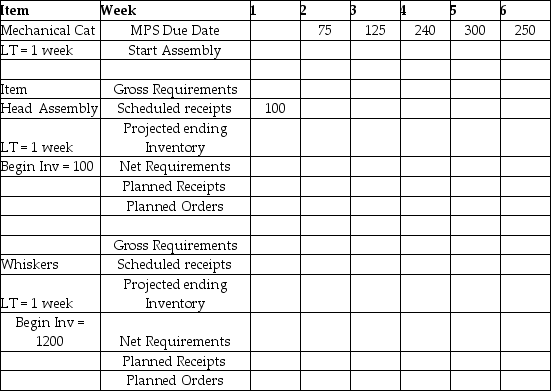


Unlock Deck
Unlock for access to all 96 flashcards in this deck.
Unlock Deck
k this deck
64
What are the net requirements for head assemblies in Week 4?
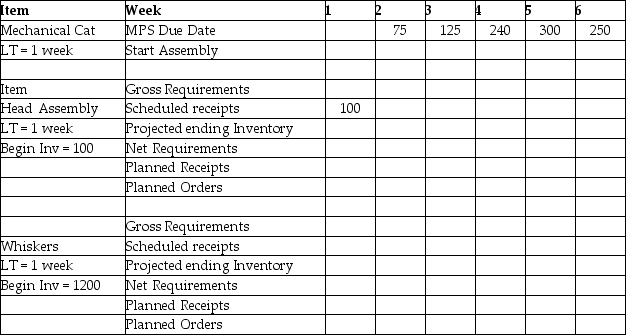


Unlock Deck
Unlock for access to all 96 flashcards in this deck.
Unlock Deck
k this deck
65
In material requirements planning, units already on order are referred to as ________ receipts and new orders are termed ________ receipts.

Unlock Deck
Unlock for access to all 96 flashcards in this deck.
Unlock Deck
k this deck
66
The table shows a master schedule for end item Z that is produced according to the product structure tree shown below. Beginning inventories and lead times for components of Z are given in the table. The lot sizes for A, B, and C are 100 units and an L4L rule for E. Complete a materials requirement plan for components A, B, and C.

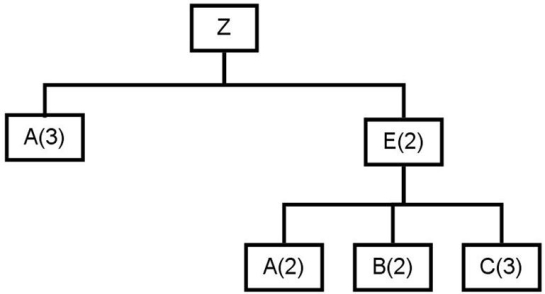





Unlock Deck
Unlock for access to all 96 flashcards in this deck.
Unlock Deck
k this deck
67
What are the third, fourth, and fifth jobs in a critical ratio sequence?
A)Job 6, Job 5, Job 2
B)Job 2, Job 5, Job 7
C)Job 6, Job 4, Job 7
D)Job 4, Job 2, Job 7
A)Job 6, Job 5, Job 2
B)Job 2, Job 5, Job 7
C)Job 6, Job 4, Job 7
D)Job 4, Job 2, Job 7

Unlock Deck
Unlock for access to all 96 flashcards in this deck.
Unlock Deck
k this deck
68
What are the net requirements Front Leg Assemblies in Week 4
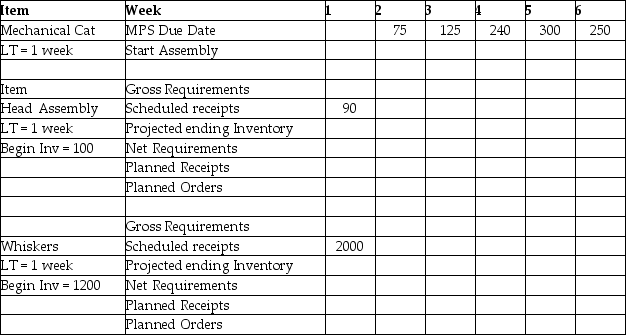


Unlock Deck
Unlock for access to all 96 flashcards in this deck.
Unlock Deck
k this deck
69
Consider the product structure tree shown below: 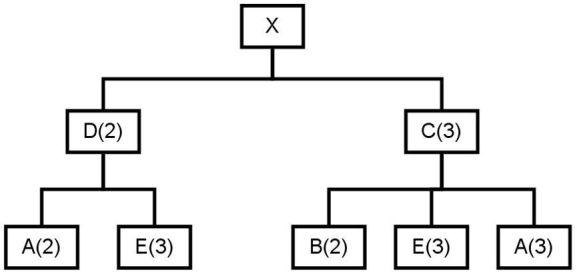 Assume that the company using this product structure tree has 5 items each at the 0 level, 10 items each at the 1 level and 20 items each at the 2 level. How many units of A, B, and E will the company need to acquire in order to ship an order of 20 X's?
Assume that the company using this product structure tree has 5 items each at the 0 level, 10 items each at the 1 level and 20 items each at the 2 level. How many units of A, B, and E will the company need to acquire in order to ship an order of 20 X's?
 Assume that the company using this product structure tree has 5 items each at the 0 level, 10 items each at the 1 level and 20 items each at the 2 level. How many units of A, B, and E will the company need to acquire in order to ship an order of 20 X's?
Assume that the company using this product structure tree has 5 items each at the 0 level, 10 items each at the 1 level and 20 items each at the 2 level. How many units of A, B, and E will the company need to acquire in order to ship an order of 20 X's?
Unlock Deck
Unlock for access to all 96 flashcards in this deck.
Unlock Deck
k this deck
70
What are the net requirements for whiskers in Week 3?
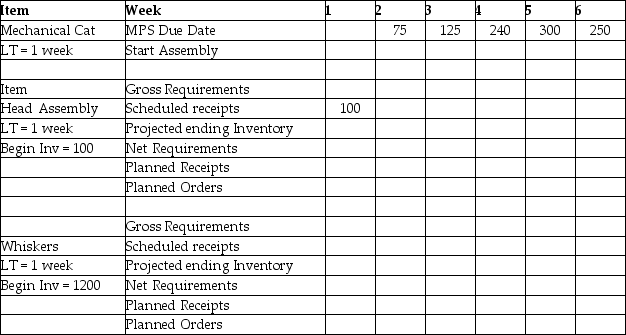


Unlock Deck
Unlock for access to all 96 flashcards in this deck.
Unlock Deck
k this deck
71
What is the planned order for whiskers in Week 2?
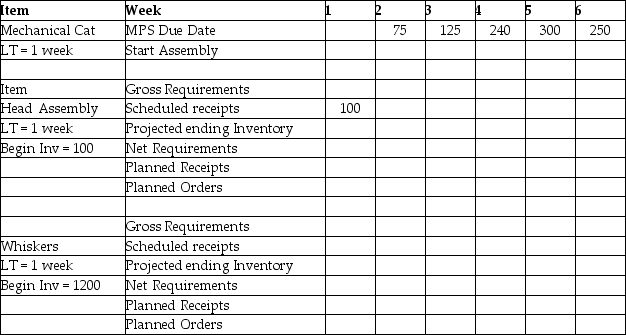


Unlock Deck
Unlock for access to all 96 flashcards in this deck.
Unlock Deck
k this deck
72
Consider the product structure tree shown below: 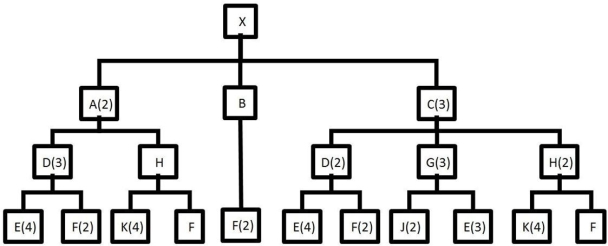 With a beginning inventory of twenty for all components on level one, five for all components on level two, and zero for all components on level three and finished items, how many of each component on level three are needed to produce 25 product X's?
With a beginning inventory of twenty for all components on level one, five for all components on level two, and zero for all components on level three and finished items, how many of each component on level three are needed to produce 25 product X's?
 With a beginning inventory of twenty for all components on level one, five for all components on level two, and zero for all components on level three and finished items, how many of each component on level three are needed to produce 25 product X's?
With a beginning inventory of twenty for all components on level one, five for all components on level two, and zero for all components on level three and finished items, how many of each component on level three are needed to produce 25 product X's?
Unlock Deck
Unlock for access to all 96 flashcards in this deck.
Unlock Deck
k this deck
73
What is the average lateness of these seven jobs if they are scheduled using the critical ratio criterion?
A)24.3
B)21.7
C)22.5
D)23.4
A)24.3
B)21.7
C)22.5
D)23.4

Unlock Deck
Unlock for access to all 96 flashcards in this deck.
Unlock Deck
k this deck
74
Consider the product structure tree shown below: 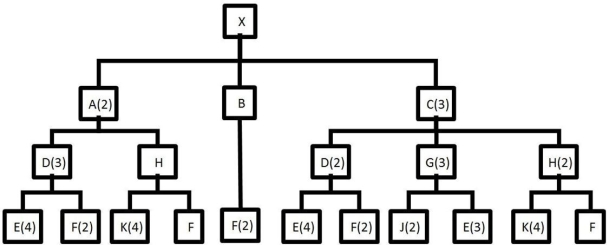 With a beginning inventory of fifteen for all components on level one, twenty for all components on level two, and zero for all components on level three and finished items, how many of each component on level three are needed to produce 20 product X's?
With a beginning inventory of fifteen for all components on level one, twenty for all components on level two, and zero for all components on level three and finished items, how many of each component on level three are needed to produce 20 product X's?
 With a beginning inventory of fifteen for all components on level one, twenty for all components on level two, and zero for all components on level three and finished items, how many of each component on level three are needed to produce 20 product X's?
With a beginning inventory of fifteen for all components on level one, twenty for all components on level two, and zero for all components on level three and finished items, how many of each component on level three are needed to produce 20 product X's?
Unlock Deck
Unlock for access to all 96 flashcards in this deck.
Unlock Deck
k this deck
75
What is Projected ending inventory for Front Leg Assemblies in Week 3
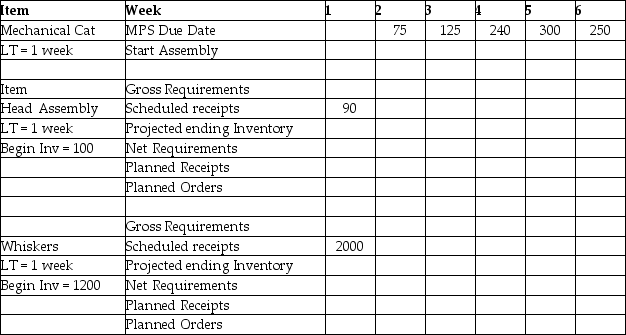


Unlock Deck
Unlock for access to all 96 flashcards in this deck.
Unlock Deck
k this deck
76
What organizational disciplines are required in order for an organization to successfully run a material requirements planning system?

Unlock Deck
Unlock for access to all 96 flashcards in this deck.
Unlock Deck
k this deck
77
What are three advantages of using an MRP system?

Unlock Deck
Unlock for access to all 96 flashcards in this deck.
Unlock Deck
k this deck
78
Cow Company used the master schedule to monitor key resource requirements, such as determining how many workers and the number of machine hours would be needed for each production period. This approach is known as ________.

Unlock Deck
Unlock for access to all 96 flashcards in this deck.
Unlock Deck
k this deck
79
Using the information in the table, determine a schedule for these five jobs using the critical ratio sequence.
A)C-D-B-E-A
B)A-C-E-B-D
C)C-A-E-B-D
D)A-D-B-E-C
A)C-D-B-E-A
B)A-C-E-B-D
C)C-A-E-B-D
D)A-D-B-E-C

Unlock Deck
Unlock for access to all 96 flashcards in this deck.
Unlock Deck
k this deck
80
What is the Planned order for Front claws in Week 3?
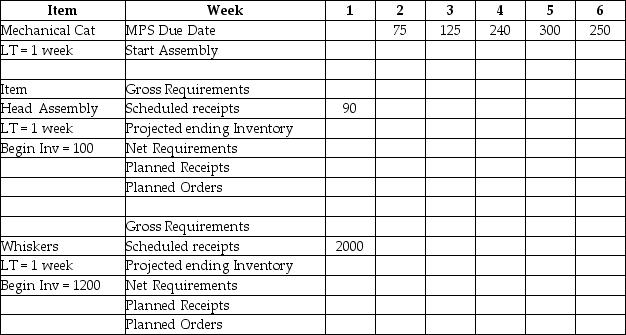


Unlock Deck
Unlock for access to all 96 flashcards in this deck.
Unlock Deck
k this deck


